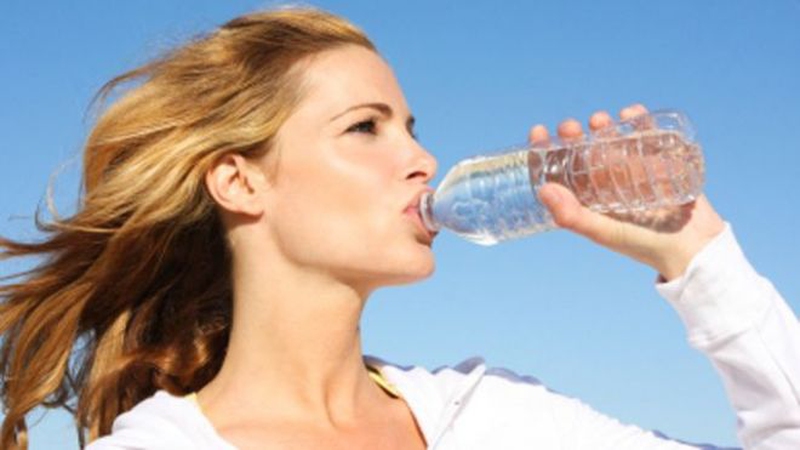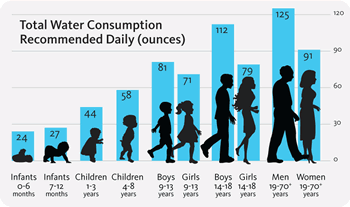Water is truly the essence of life and no one can deny the fact. About 60% to 70% of your body is nothing but water, and every cell in your body needs water to function properly. Water serves as the main ingredient of all body fluids, including blood, digestive juices, lymph, tears, urine, and sweat. Moreover, water is involved in most bodily functions, including circulation, digestion, and absorption. It is therefore important to know exactly how many pints of water a day will help keep you healthy. Keep reading to learn more about it.

How Many Pints of Water Should You Drink a Day?
Four pints or 64 ounces
It is important to understand though that how much water you need varies greatly from person to person depending on climate, size, and diet. Drinking 4 pints of naturally cleaned water a day will work fine for most people because it helps keep dehydration at bay that puts your body under stress and causes more dehydration. Just bear in mind that it is better to drink little but more often to prevent dehydration. Make sure that you do not drink more than a couple of pints within an hour. Similarly, avoid drinking more than 6 pints in a day. The only situation when you may benefit from drinking more than 6 pints is when you are a professional athlete or runner.
Is There Such a Thing as Drinking Too Much Water?
Yes, it is possible to drink too much water, but it is quite rare. You may enter a state called hyponatremia when your amount of water is a lot higher than sodium in your body. This may even lead to electrolyte imbalance and cause serious issues. When you lose water through elimination or excessive sweating, you also lose electrolyte. Drinking excessive water in this case will further dilute any electrolytes left in your body. This may cause your interstitial sodium levels to go down to a dangerous level.
It is therefore a good idea to stick to electrolyte drinks or sports drink when you lose water through profuse sweating. Otherwise, you can simply take half a teaspoon of sea salt and mix it in a glass of water. Drink it to maintain water-sodium balance in your body.
Myths About Drinking Water
Myth: You should drink water only when you are thirsty to meet your fluids need.
While this may work a bit for sedentary folks, it is not a great idea for anyone who is active. If you exercise, you may never realize how much water your body needs. Research shows that exercise can actually blunt your thirst mechanism and confuse your brain. It means that even if your body needs water, you may not feel thirsty. It is therefore a good idea to drink at least 20 ounces of water before your exercise as the liquid takes about an hour to travel from your gut to your muscles.
Myth: Both coffee and tea can dehydrate you.
While you may be paying more bathroom visits after drinking tea or coffee, they still help hydrate you in some ways. It is nothing but water unless you add dairy or flavored syrups to it. The truth is you do not need to worry about dehydration when you drink caffeinated beverages in moderation. Drinking less than five cups a day is just fine.
Myth: You lose weight when you drink water before a meal.
It is just another myth that comes from the idea that water will make you feel full and you will eat less. The truth is that water will never keep you from overeating because it never binds to the food and goes out of your system quite quickly. If you really want to cut calories, you may want to consider padding your meals with water in different ways.
Including more vegetables in your diet will help because vegetables contain water and move through your stomach with the rest of the meal. This may help make you feel full. Similarly, chicken noodle or broth-based soups are a great way to fill up on water. It means your emphasis should be on food that contains water because drinking water separately is not going to help you lose weight.
Myth: You will get more benefits from drinking vitamin water.
Just when you know exactly how many pints of water a day, you may also want to know how to maximize the benefits of drinking water. This is when most people turn to fortified or vitamin water thinking it contains several nutrients like vitamin C. The truth is that vitamin water works quite the same as plain water does. Fortified waters may not have a right balance of vitamins and they also take some time to make into your bloodstream. If you are really interested in getting all the nutrients, consider mixing some water or seltzer with your favorite juice.
Myth: I do not need to worry about dehydration while swimming.
Just because you are in the water does not mean you cannot get dehydrated. In fact, experts believe you are more likely to become dehydrated when you spend an extended period in the swimming pool. This happens because after staying in the pool for a good amount of time, you may not like the idea of drinking a glass of water. It is psychological than anything else. Moreover, you may not feel thirsty after a long session of swimming because your brain controls thirst considering the volume of blood at the center of your body. A lack of blood in this region signals your brain that you are thirsty, but swimming can trip up the system by pushing blood from your skin to your core. So, be sure to drink water even if you have spent long enough in the pool.



View All Comments /Add Comment